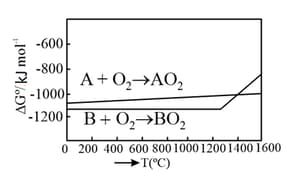HARD
Earn 100
Standard entropies of and are 60, 40 and 50 J respectively. For the reaction to be at equilibrium, the temperature should be
(a)
(b)
(c)
(d)
50% studentsanswered this correctly
Important Questions on Chemical Thermodynamics
MEDIUM
at
Hence in is _____________.
MEDIUM
HARD
The standard state means that the pressure should be 1 bar, and substance should be pure at a given temperature. The conversion of graphite [ (graphite)] to diamond [ (diamond)] reduces its volume by . If (graphite) is converted to (diamond) isothermally at , the pressure at which (graphite) is in equilibrium with (diamond), is
[Useful information: ]
MEDIUM

HARD
The surface of copper gets tarnished by the formation of copper oxide. gas was passed to prevent the oxide formation during heating of copper at 1250 K. However, the gas contains 1 mole % of water vapour as impurity. The water vapour oxidises copper as per the reaction given below:
Is the minimum partial pressure of (in bar) needed to prevent the oxidation at . The magnitude of value of is ____.
(Given: total pressure = 1 bar, R (universal gas constant) are mutually immiscible.
At
)
Round off the answer up to the nearest integer.
MEDIUM
EASY
MEDIUM
EASY
EASY
MEDIUM
For a dimerization reaction,
at ,then the will be …...
Give an answer to the nearest integer value.
EASY
MEDIUM
EASY
EASY
For the reaction,
.
What is the value of free energy change, at for the reaction?
EASY
MEDIUM
MEDIUM
and are, respectively, and at 298 K. The equilibrium constant for the reaction at 298 k is:
HARD
HARD
The standard free energy of the formation of is at . What is the standard free energy of the formation of at ?

